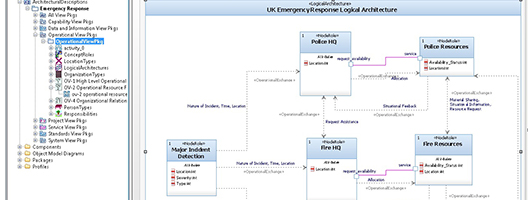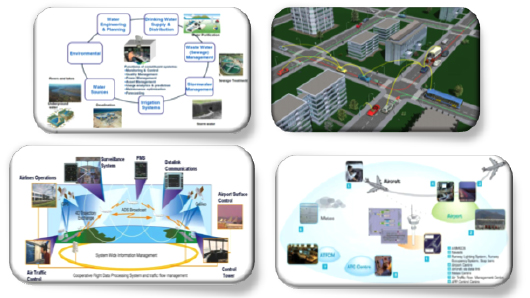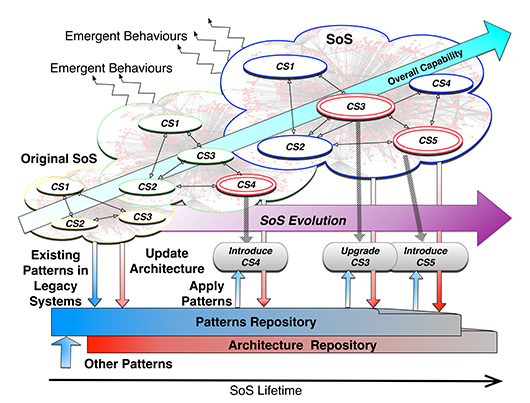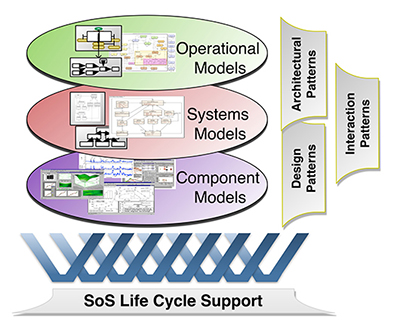Modelling and Simulation

Designing for Adaptability and evolutioN in System of systems Engineering DANSE
Overview
Systems of Systems (SoS) consist of collections of (possibly independent, pre-existing, geographically distributed and following their own goals) constituent systems whose behaviours are coordinated to provide services and additional value with respect to their original intended operations. These systems are managed and coordinated to achieve a common goal and can appear on the scene and (willingly or unwillingly), leave it at any time and in any order. The concept that a SoS does not necessarily reach an end state in its lifecycle, because of its need to constantly evolve or change to emerging requirements is very challenging. The importance of emergent behavior (desirable and unintended) must be addressed with a view to carefully managing it throughout the SoS lifecycle including concepts for assessment. The SoS offer severe technical, management, and political challenges as witnessed by energy blackouts such as the one experienced by Italy in 2003 and the emergency management disaster in response to the hurricane Katrina in 2005.
DANSE aims at developing new approaches to the design and management of the operation of SoS based on advanced methodologies based on a new evolutionary:
- Adaptive and iterative SoS life-cycle model;
- Semantically sound models based on the notion of contracts;
- Innovative architectures that provide the infrastructure to allow the dynamic affiliation of components so that the behaviour of the ensemble is not disturbed;
- Novel supporting model based tools for analysis, simulation, and optimization;
- Organized in an integrated environment.
DANSE focuses on the development of a new methodology to support evolving, adaptive and iterative SoS life-cycle models based on a formal semantics for SoS inter-operations and supported by novel tools for analysis, simulation, and optimisation.
DANSE is developing training material and classes that help advance the knowledge base of European industry and government to allow the creation of new services and to substantially improve existing ones to levels of efficiency that are unthinkable today.
DANSE includes industrial representatives with focus on Aerospace and Land systems and Automotive, leading tools and framework provider in the system space and top European research institutes in system engineering. The partners have a deep interest in the outcome of the research and are eager to deploy them as soon as they become available.
Three Test Cases Air Traffic Management, Autonomous Ground Transport and Integrated Water Treatment and Supply which are real industrial problems planned for commercial development, have been identified to validate DANSE approach. The last case is a full-fledged industrial project used for the demonstration of the DANSE paradigm.

Technical Approach
For the implementation of the project, DANSE uses a spiral development process.
- The first iteration focuses on SoS high-level modelling and integration analysis, introducing the new DANSE SoS formalisation, with initial ability to model, simulate and analyse the behaviour of the constituent systems and the SoS as a whole. Therefor the focus is on new languages and semantics for enhanced SoS design.
- The second iteration adds early validation aspects of constituent systems, more robust simulation and early optimisation techniques, i.e. the new SoS semantics for new formation of simulation, optimisation and formal analysis techniques.
- The third and last iteration enhances the first two cycles with full demonstration of DANSE methodology, including its developed analysis, simulation and optimisation techniques, supported by the DANSE systems engineering life-cycle.

To achieve these challenges DANSE addresses the following innovation points:
- A new evolutionary, adaptive and iterative SoS life-cycle model, offering evolutionary simulation, analysis, and development of the SoS in real time.
- Development of new formal semantics for SoS modelling based on an architectural framework and extending the SPEEDS concept of “contracts” to provide a formal semantic language that applies directly to SoS.
- A formal method for “correct by evolution” analysis which constantly guarantees that the SoS evolves towards its current goals.
- High-level behavioural simulation based on SoS abstraction using theoretical relationships rather than detailed event-level simulation and using statistical approaches to capture the limited knowledge of the component systems.
- Methods and tools to allow optimisation at the global SoS level and at the local level of constituent systems, in face of possibly contradicting goals.

Project Consortium
The DANSE project consortium includes:
- Advanced Laboratory on Embedded Systems s.r.l.
- Carmeq - GMBH
- EADS deutschland - GMBH
- European aeronautic defence and space company eads - france sas
- IBM Israel - Science and Technology Ltd
- Institut National de Recherche en Informatique et en Automatique - France
- Israel Aerospace Industries Ltd
- Loughborough University
- Sodius SAS
- Thales SA
>> Click here for further details
Want to know more?
Contact r.s.kalawsky@lboro.ac.uk, +44 (0)1509 63 5678
